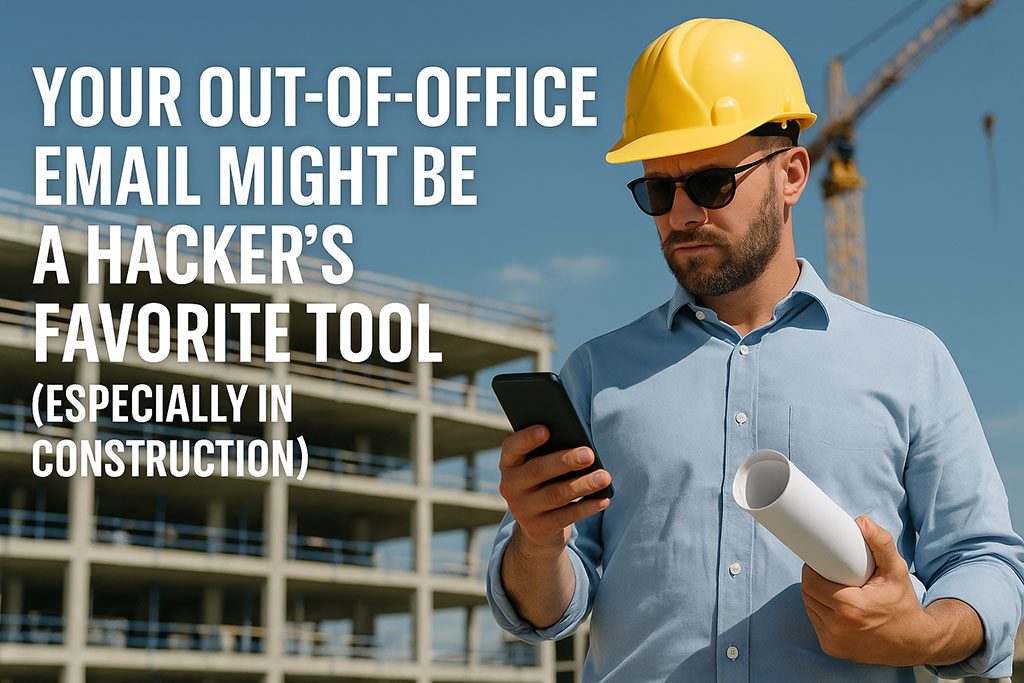
Look—I know you’ve earned that vacation.
Maybe you’re heading down to Lake Powell, or catching a few rounds of golf up in Heber. Before you go, you set that trusty Out-of-Office reply:
“I’m out until Monday. For urgent matters, contact Steve in accounting.”
Sounds harmless, right?
Wrong.
If you’re part of a construction company in Salt Lake City and using standard auto-replies, you could be handing cybercriminals the blueprint for a successful attack on your business.
Construction Cybersecurity Threats Don’t Take Time Off
Salt Lake’s construction season peaks in the summer—and so does hacker activity. Your vacation email might seem like a formality, but to a cybercriminal? It’s an open door.
Here’s what that one auto-reply gives them:
🔓 Your full name and job title
🔓 Confirmation you're not watching your inbox
🔓 A direct line to another employee
🔓 Internal team structure and hierarchy
🔓 Clues about where you’re traveling or what project you're on
For a hacker running a Business Email Compromise (BEC) scam, this is like pouring the foundation before you’ve even shown up to the job site.
Real-World Scenario: How a Simple Auto-Reply Becomes a Construction IT Nightmare
You’re OOO. Your email auto-reply triggers.
A cybercriminal crafts a fake message, pretending to be you—or worse, your boss.
They send Steve in accounting an “urgent invoice approval” or a “project wire transfer” request. Steve doesn’t think twice. He processes it.
By the time you’re back at your desk, you’ve lost thousands—and possibly compromised a major project bid.
Sound far-fetched? It’s not. We’ve seen this exact thing happen to construction companies in Utah.
Why Salt Lake City Construction Firms Are Prime Targets
Construction companies deal in:
- Frequent project-based travel
- High-value payments and contracts
- Multiple layers of subcontractors and vendors
- Fast-paced, high-pressure communication
That means if your IT systems aren’t locked down, your whole operation is at risk—especially when team members are out of office.
5 Ways to Protect Your Construction Business from OOO Email Exploits
Whether you run a GC firm in Sandy or a concrete crew in Ogden, here’s how to lock down your vacation replies—and your whole network.
- Keep Auto-Replies Short & Generic
Don’t advertise who's gone or who's in charge. Avoid job titles, names, or dates.
🛠️ Better Example:
“I’m currently away from my email. For urgent matters, contact our main office at [main office contact].”
- Train Your Team on Phishing and Spoofing
Especially your admins, PMs, and accounting folks. If an email involves wire transfers, contracts, or login requests—verify it via phone or face-to-face.
- Use Enterprise-Grade Email Security
Make sure your Managed IT Services provider has tools like:
✅ SPF, DKIM, and DMARC
✅ Advanced phishing filters
✅ Domain spoofing protection
If your MSP hasn’t mentioned these, you’ve got a bigger issue.
- Enforce Multi-Factor Authentication (MFA)
Yes, even on field tablets and shared logins. One stolen password shouldn’t be all it takes to derail your project.
- Work with a Proactive Construction IT Partner
You need a team that understands construction timelines, compliance, and the unique way your crews communicate—both on and off the job site.
Ready to Vacation Without Worrying About Hackers?
We work with construction companies across Salt Lake City to keep their systems secure, their data locked down, and their employees trained—even when half the team’s out catching trout.
👉 Book Your FREE Construction Cybersecurity Assessment
We’ll identify the gaps, fix the vulnerabilities, and help you sleep better—whether you’re in the office or off the grid.



